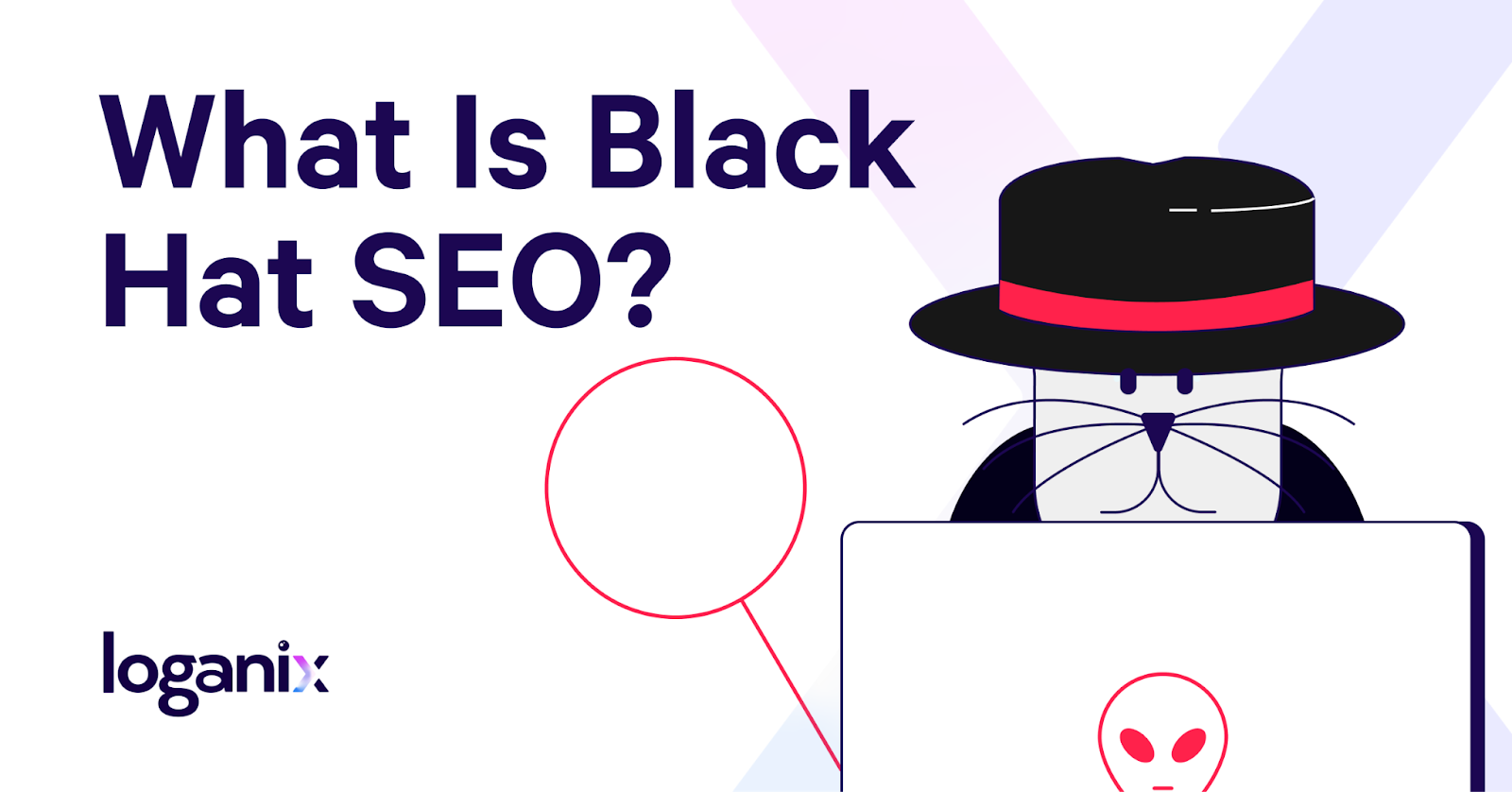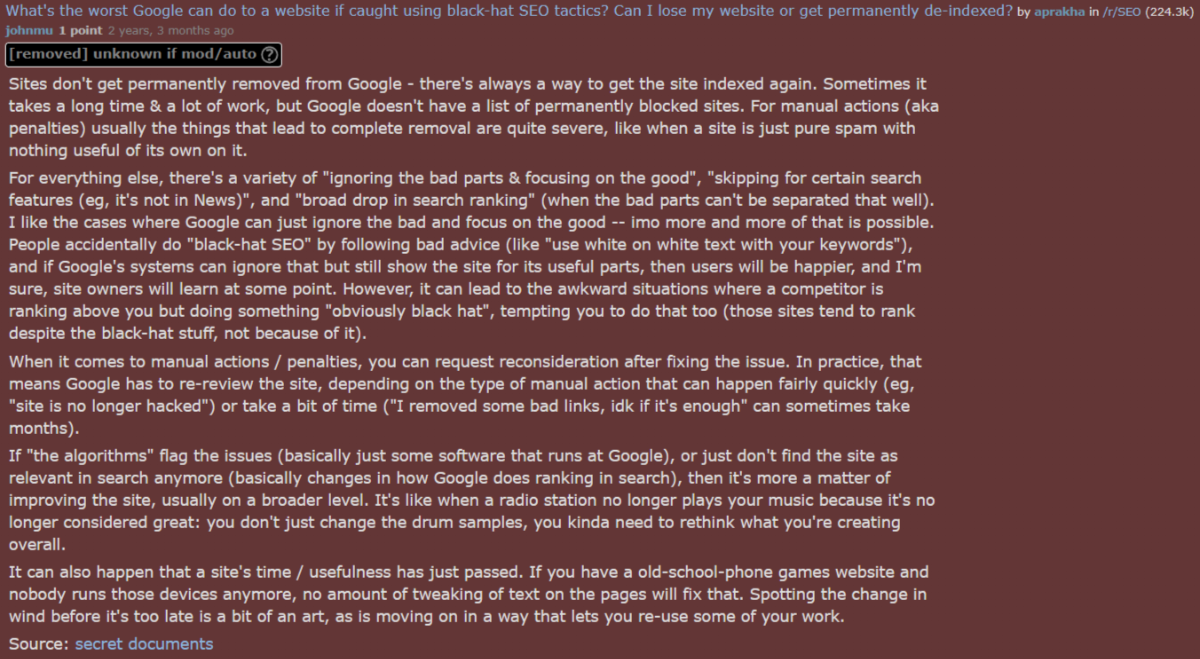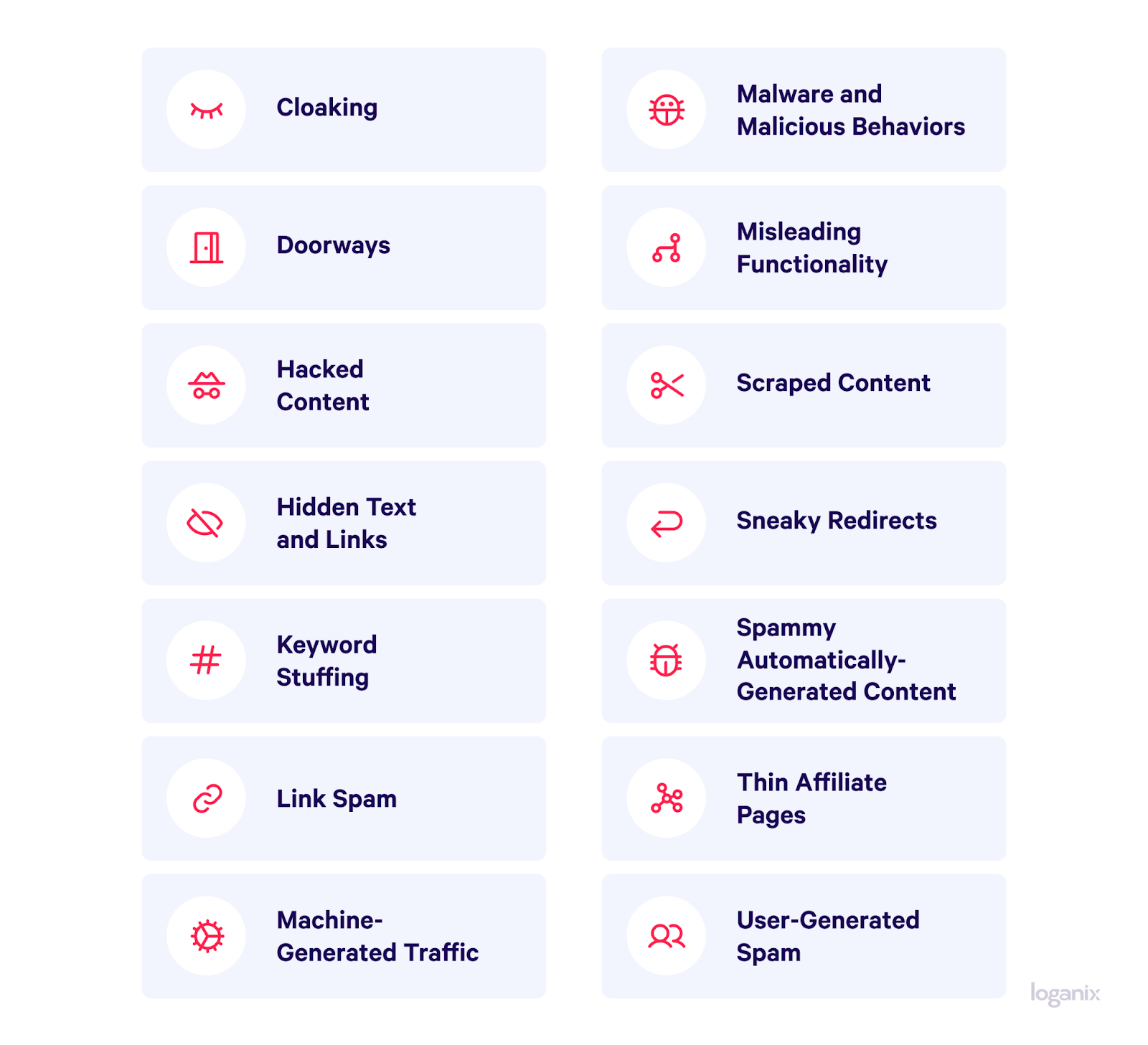What Is Black Hat SEO? The Dark Side of Search Optimization

Hand off the toughest tasks in SEO, PPC, and content without compromising quality
Explore ServicesThere’s always value in shining a light on all facets of SEO, even its darkest corners.
Understanding these more nefarious aspects not only guards against potential pitfalls or temptations but also broadens your overall grasp of how search engines work.
So, let’s dig into the underbelly of the SEO world—black hat SEO. Stick around as we
- ask the question, “What is black hat SEO,”
- delve deep into the risks associated with black hat SEO,
- and break down exactly which tactics are viewed by Google as black hat.
What Is Black Hat SEO?
Straight from the horse’s mouth, Google defines black hat webspam as, “In the pursuit of higher rankings or traffic, a few sites use techniques that don’t benefit users, where the intent is to look for shortcuts or loopholes that would rank pages higher than they deserve to be ranked.”
In other words, black hat SEO prioritizes quick, unearned ranking improvements over genuine value or content quality. These strategies prey on perceived “algorithm loopholes” to artificially inflate a website’s visibility on the search engine results pages (SERPs).
Learn more: SEO glossary 250+ terms explained.
Black Hat SEO vs. White Hat SEO
SEO can be done ethically or unethically. As we just defined, black hat SEO is the practice of using nefarious and unethical practices to optimize (or manipulate) web content. The end goal: to raise a site’s ranking in search engine results pages.
White Hat SEO, on the other hand, is the practice of optimizing web content to raise a site’s ranking in search engine results pages by following guidelines established by search engines like Google.
The High Stakes Game of Black Hat SEO
Search engines have a vested interest in providing high-quality, trustworthy results, and they’re constantly evolving to detect and penalize black hat tactics. This means the gains are often temporary, even if a black hat tactic initially works.
As importantly, black hat strategies aren’t aligned with enhancing the user experience. They exist solely to manipulate search engines, and ironically, these are the very thing they are most likely to provoke—the wrath of the Google gods.
Consequence of Wearing a Black Hat
As an example of the risks, a now-deleted Reddit comment from John Mueller demonstrates why black hat SEO tactics simply aren’t worth the risk.
The thread’s OP asks, “What’s the worst Google can do to a website if caught using black hat SEO tactics? Can I lose my website or get permanently de-indexed?
John replies: “Sites don’t get permanently removed from Google—there’s always a way to get the site indexed again. Sometimes, it takes a long time and a lot of work, but Google doesn’t have a list of permanently blocked sites. For manual actions (aka penalties), usually, the things that lead to complete removal are quite severe, like when a site is just pure spam with nothing useful of its own on it.”

He continues: “When it comes to manual actions/penalties, you can request reconsideration after fixing the issue. In practice, that means Google has to re-review the site, depending on the type of manual action that can happen fairly quickly (e.g., “site is no longer hacked”) or take a bit of time (“I removed some bad links, idk if it’s enough” can sometimes take months).”
Months. Yikes!
Notorious Black Hat SEO Tactics

So you can be sure you’re not stepping into black hat territory, let’s explore the most commonly used (and penalized) black hat SEO tactics.
1. Cloaking
Cloaking displays two versions of content: one for the search engine and another for the user. Why? To artificially boost a site’s search engine rankings by misguiding the user. A user clicks on a search result expecting helpful information, only to be directed to an unrelated or harmful site.
2. Doorways
These are sites or pages created to rank for specific search queries, leading users to less useful intermediate pages before reaching the actual destination. They may involve having multiple websites with slight variations to URLs and home pages or targeting specific regions or cities with a network of similar pages.
3. Hacked Content
Hacked content is unauthorized content placed on a site due to vulnerabilities in its security. The malicious activities range from code injection and page injection to content injection and redirects, which can harm a site’s visitors or its performance in search results.
4. Hidden Text and Links
Hidden text or links are placed on a page solely to manipulate search engines. Often, hidden text is camouflaged to match the background color, tucked off-screen using CSS, or made minuscule with tiny font sizes.
5. Keyword Stuffing
In their pursuit to manipulate search engine rankings, webmasters saturate a webpage with specific keywords or numbers, making the content seem unnatural and spammy.
6. Link Spam
When links are manipulated to inflate a site’s search rankings, they turn into what’s known as ‘link spam.’ This shady tactic includes indulging in excessive link exchanges, excessively placing backlinks in forums or blog post comment sections, or requiring a link to be included in a Terms of Service.
7. Machine-Generated Traffic
It’s against Google’s policies to send automated, bot-generated queries or scrape Google’s results to check your site’s rank. It might sound harmless, but these types of ‘robotic’ traffic aren’t just against the rules—they can disrupt the service for everyone else.
8. Malware and Malicious Behaviors
Websites hosting malware or unwanted software that negatively affects the user experience can be penalized. Malware includes any software designed to harm a computer, a mobile device, the software it’s running, or its users.
9. Misleading Functionality
Imagine coming across a website that boasts a nifty countdown timer tool, only to be swarmed with deceptive ads instead of getting the service you expected. Tactics like this are what is referred to as “misleading functionality.” It’s a trick some sites use to make you believe you’re getting something you’re not.
10. Scraped Content
Sites that “scrape” or copy and republish content from more reputable sites without adding original content or value may be penalized. This practice can also constitute copyright infringement.
11. Sneaky Redirects
Sneaky redirects are deceptive tactics that divert visitors to a different URL than the one they initially clicked on. The objective is to present users and search engines with unexpected content, often misleading or irrelevant to the original request.
Learn more: what is a redirect?
12. Spammy Automatically-Generated Content
Have you ever landed on a page filled with gibberish, nonsensical text, or content that seems strangely off-topic? You’ve likely encountered spammy, automatically generated content. This refers to content that’s churned out by an automated program without any genuine effort to create something original or valuable.
13. Thin Affiliate Pages
Thin affiliate pages are web pages that you’ll find loaded with product affiliate links. These pages merely copy product descriptions and reviews from the original merchant, contributing no original content or added value of their own.
14. User-Generated Spam
User-generated spam refers to spammy content added to a site by users through a channel intended for user content. This can include spammy posts on forum threads, comment spam on blogs, or spammy files uploaded to file hosting platforms.
Engaging in any of these practices can lead to severe penalties, including the potential for a website to be removed entirely from search engine results. Sticking to ethical, white hat SEO strategies that prioritize creating high-quality content and providing a positive user experience is essential.
Black Hat SEO FAQs
Q1: Is Black Hat SEO Illegal?
Answer: Technically, no, but some of the techniques are unethical. While there are no official governmental laws regarding black hat SEO practices, if you’re employing SEO tactics that go against Google’s spam policies, you risk being de-listed or dropped in the rankings.
Q2: Does Black Hat SEO Still Work?
It depends on how it is applied. Using black hat SEO techniques to get to the top of the rankings for very competitive keywords can be difficult now, but you may still find some success with them.
Eventually, though, Google catches on to nefarious tactics and tweaks its algorithms accordingly. The more basic forms of black hat SEO, like doorway pages, invisible text, link farms, low-quality content, and keyword stuffing, are long outdated and are now easily detected by Google algorithms.
Q3: What Are the Disadvantages of Doing Black Hat SEO?
Google emphasizes ethical SEO practices and has taken measures against “black hat webspam.” While not explicitly stating they “permanently ban” sites, Google does reduce rankings for sites violating their quality guidelines. They advise focusing on “high-quality sites that create a good user experience and employ white hat SEO methods” to ensure compliance with their guidelines.
Q4: Why Are Black Hat SEO Techniques Not Recommended?
One of the major reasons why people resort to black hat SEO techniques is that they think it is easy and that such tactics are easy to pull off. But it’s not so. These techniques come with numerous risks, which are far too high for any business that wishes to succeed in the world of search engine optimization.
Conclusion
Here’s a foolproof litmus test to determine whether a practice you’re considering or already using is black hat hinges on its intention: Is it designed to genuinely enrich the user experience, or is it solely aimed at deceiving search engine algorithms?
If the latter rings true, then you’re likely venturing into the realm of black hat SEO.
Don’t leave your site’s reputation to chance with risky SEO tactics.
At Loganix, we pride ourselves on our ethical, white-hat SEO practices, committed to helping you build a robust and sustainable online presence. Let us assist you in enhancing your website’s performance and elevating your ranking on search engine results pages—the right way.
🚀 Check out our suite of services, and let’s journey toward online success together! 🚀
Hand off the toughest tasks in SEO, PPC, and content without compromising quality
Explore ServicesWritten by Aaron Haynes on October 31, 2021
CEO and partner at Loganix, I believe in taking what you do best and sharing it with the world in the most transparent and powerful way possible. If I am not running the business, I am neck deep in client SEO.





